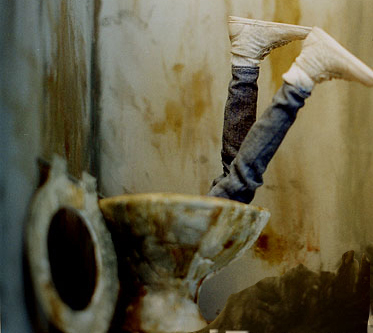 After the lurid death of the cap-and-trade bill in Congress, global warming more or less disappeared from the national political landscape. Since there’s no climate legislation on the table and none proposed, no ongoing debate on the subject, nothing real to talk about, climate hawks have been reduced to a form of analysis I call “climatespotting.” It amounts to counting the number of times the term “climate change” is uttered by a politician (especially Obama) or political organization. It’s as though the very term is an endangered bird — every time it flitters across a screen somewhere, it’s met with great excitement.
After the lurid death of the cap-and-trade bill in Congress, global warming more or less disappeared from the national political landscape. Since there’s no climate legislation on the table and none proposed, no ongoing debate on the subject, nothing real to talk about, climate hawks have been reduced to a form of analysis I call “climatespotting.” It amounts to counting the number of times the term “climate change” is uttered by a politician (especially Obama) or political organization. It’s as though the very term is an endangered bird — every time it flitters across a screen somewhere, it’s met with great excitement.
Climatespotters spend a great deal of energy attempting to interpret the sightings, seeking patterns and larger meanings. Obama didn’t mention climate in his State of the Union this year. That meant he’d abandoned all pretense of leadership and was an historic failure. Then in April, in Rolling Stone, he said climate change “will become part of the campaign, and I will be very clear in voicing my belief that we’re going to have to take further steps to deal with climate change in a serious way.” That meant he was a climate hero! Then he dropped the subject again for a long time. Historic failure. Then, lately, he’s been saying in campaign speeches that “denying climate change won’t make it stop.” Hero!
I suspect the Democratic convention will serve as an occasion for a great deal more climatespotting. We know now that the term “climate change” appears 18 times in the Democratic Party Platform (as opposed to once, mockingly, in the Republican Platform). Hero! But according to National Journal, “[i]nterviews with campaign staff and a look at the lineup of convention speakers indicate that climate change won’t be a top-tier issue during the convention.” Failure!
I get why this happens, and have been guilty myself, as has Grist, but it’s worth remembering that very little hinges on how much Obama and other politicians say the words “climate change.” In the long term, obviously, it is important that everyone talk about it more. But these short-term rhetorical fluctuations during the campaign only serve to distract from the more enduring — and boring, and frustrating, and familiar — reasons for stasis on climate policy.
Political reporters have been increasingly vocal about the fact that this campaign sucks. It’s been a petty procession of pseudo-gaffes, deceptions, and outrages-of-the-week. Everything is locked down; nothing is spontaneous; no one is inspired or particularly passionate. It’s a grind. Yet on the other hand, there’s a sense that this really is the most important presidential election ever. Can this campaign be the most trivial and the most important at once?
Yes. Here’s why: U.S. constitutional government is set up so that the opposition party has a) the electoral incentive to block the ruling party’s agenda, and b) the power to do so, especially since abuse of the filibuster became routine. In other words, there’s nothing in the rules of the U.S. system to prevent total gridlock. It was prevented in post-war America by a certain level of diversity within the parties — conservative Democrats in the South, liberal Republicans in the Northeast — and presumptive adherence to norms of behavior that kept the system running (like, say, not filibustering every bill or holding the debt ceiling hostage).
Neither of those conditions obtain any more. The parties have ideologically clarified. The right, in particular, has become progressively more extreme since 1980 or so. As a part of that process, it began spurning those behavioral norms, becoming, in the immortal words of Thomas Mann and Norm Ornstein, “a resurgent outlier: ideologically extreme; contemptuous of the inherited social and economic policy regime; scornful of compromise; un-persuaded by conventional understanding of facts, evidence, and science; and dismissive of the legitimacy of its political opposition.”
So now we have a party of radicals who vowed, even as Obama took office, that they would make his defeat their top priority. Their Senate leader even announced it publicly. And since early 2010, they have had more than 40 votes in the Senate, so they can filibuster, and have filibustered, everything. Washington reporters are still obliged to pretend that there’s some way Obama could have overcome this determined opposition, but no one’s offered a plausible story about how.
What will Obama accomplish in a second term? As long as Republicans have 40 votes in the Senate, much less a majority in one or both houses, the likelihood is: very little. They won’t let him! They’ve shown no willingness to compromise for four years and there’s no reason to think that will change. In fact, they are explicitly pledging to continue with total opposition. That is the depressing baseline fact that defines this election.
Now, if Romney wins and Republicans take the House and the Senate, well then, plenty will happen. (You can bet that they’ll find a way around the filibuster.) They have an agenda so unthinkably reactionary that swing voters simply refuse to believe it’s true.
But if Obama wins, as Nate Silver says is still likely, then we’ll probably have four more years of grinding congressional gridlock and frustrated ambitions. Obama will do what he can to work around Congress, but big-picture-wise, it will be more stasis.
That’s why the Obama campaign is muted about his second-term agenda. That’s why he’s not promising any of the wildly ambitious stuff that has David Brooks all tumescent today. That’s why there’s so little “magic in the air” around the campaign this time. It’s a campaign to prevent rule by a radical reactionary party, a fight for gridlock because gridlock is better than the alternative. That’s a grim and fairly boring thing for all involved.
Anyway, to wrap this back to climate: There’s little to be learned by climatespotting during Obama’s campaign. Everyone knows that Democrats want to do something about climate change and that Republicans don’t believe in it. Insofar as that’s driving anyone’s vote, it’s already baked in. As for policy, well, the fact is that there will be no climate bill in the next four years. Republicans have both the power and the incentive to block any attempt, and everyone (except David Brooks, apparently) knows it. So instead there will be nibbling around the margins with regulations and executive orders.
That reality doesn’t make for very good campaign rhetoric. Why highlight an enormous global problem when the system you’re governing offers you so little power to do anything about it? It’s just a recipe for (more) disappointment. So you mention it now and then, just to remind everyone you haven’t forgotten it, but otherwise allow it to recede.
Until the system changes — until something is done to reform the filibuster, break the enormous influence of unregulated corporate money, or moderate the right’s drift to reactionary insanity — nothing big will happen on climate. No matter how often people mention it.



